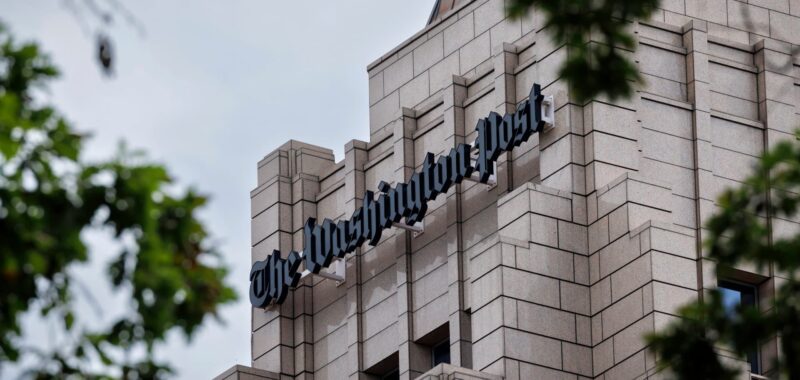The Washington Post office in Washington, DC, US, on Thursday, June 27, 2024.
Ting Shen | Bloomberg | Getty Images
Days before the presidential election, Donald Trump and his campaign have launched legal actions against two major media outlets, claiming that they are illegally helping Kamala Harris through their news coverage and advertising.
Legal experts said that Trump’s efforts are frivolous.
The Republican’s campaign on Thursday filed a Federal Election Commission complaint accusing The Washington Post of making “Illegal Corporate In-Kind Contributions” to Harris.
The campaign based its accusation on a Semafor report which said that the Post, as part of a ramped-up paid advertising campaign on social media, highlighted numerous articles critical of Trump versus more neutral coverage of the Democratic nominee.
The FEC complaint alleges that Semafor’s report indicates that the Post “is conducting a dark money corporate campaign in opposition to President Donald J. Trump.”
That claim is “completely preposterous,” Columbia Law School Professor Richard Briffault told CNBC.
There is no evidence in the allegations of any coordination between the Post and the Harris campaign,” said Briffault, who specializes in campaign finance regulation and political law.
The Post’s ads “at most” constitute independent expenditures protected by the Supreme Court decision Citizens United v. FEC, which broadened the rules on corporate election spending, he said.
“And as the Trump letter acknowledges there is no express advocacy of Harris so the Post’s actions don’t count as independent expenditures,” Briffault added.
“This is litigation by press release and not more serious than that.”
A spokesperson for the newspaper told CNBC, in a statement Friday, “As part of The Washington Post’s regular social media marketing strategy, promoted posts across social media platforms reflect high-performing content across all verticals and subjects.”
“We believe allegations suggesting this routine media practice is improper are without merit,” the spokesperson said.
Also on Thursday, Trump filed a federal civil lawsuit against CBS Broadcasting, seeking $10 billion in damages over the network’s editing of a “60 Minutes” interview with Harris that aired in early October.
The 19-page suit, which accuses CBS of unlawfully interfering in the election to help get Harris elected, is solely based on the network airing two different portions of Harris’ answer to the same question.
In an excerpt of the interview that aired on CBS’ “Face the Nation,” Harris is shown delivering one part of the answer.
But “60 Minutes” showed a different portion of Harris’ response.
Trump has repeatedly claimed on social media and at campaign rallies that the editorial move constitutes the “biggest media scandal in broadcast history.”
He has demanded that CBS lose its broadcast license, which is issued by the federal government.
“60 Minutes” on Oct. 20 slammed Trump for accusing the program of deceitful editing, calling his claim “false.”
“60 Minutes gave an excerpt of our interview to Face the Nation that used a longer section of her answer than that on 60 Minutes,” the show said in its statement then. “Same question. Same answer. But a different portion of the response.”
CBS in a statement Thursday called Trump’s lawsuit “completely without merit.”
Harvard Law Professor Noah Feldman, a constitutional law expert, told CBS that the case was an “outrageous violation of First Amendment principles.”
Rebecca Tushnet, another First Amendment attorney at Harvard Law, told CNN that the lawsuit is “ridiculous junk and should be mocked.”
Trump’s suit was filed in U.S. District Court in Amarillo, Texas, effectively guaranteeing that it would be assigned to Judge Matthew Kacsmaryk, a Trump nominee with a conservative judicial record.

